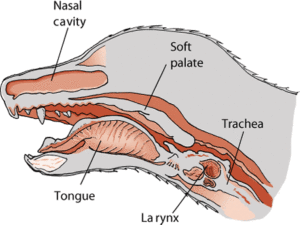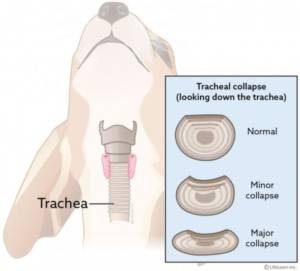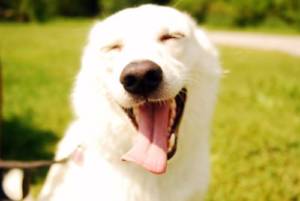It’s not uncommon for well-experienced canine owners to see their dog cough once in a while after eating food or drinking water. The occasional cough is usually harmless as dogs, too, have a cough reflex just like humans. This reflex helps to keep the respiratory system healthy.
Dogs don’t sweat in the same way as humans do. So, after a tiring fetch session, you might notice that your pooch runs straight to his/her water bowl and starts lapping immediately. Sometimes, a few drops of water might go the wrong way and cause some irritation, leading to coughing or gagging. However, if this happens on a regular basis, it might cause some concern.
Let us first understand how dogs actually drink water.
How Dogs Drink Water?
You might think your dog is actually just having fun splashing and slobbering around in his water bowl, but in reality, he is making some very precise movements at a high speed. Dogs and cats do not have a full set of cheeks, which leaves them unable to create suction with their mouths to drink water, unlike humans and elephants. Dogs lap up water with their tongue bent backwards, as shown in the picture below.

This backward movement helps them to build up momentum so that the water is formed into a column and then raised up into the mouth efficiently. This was proven by scientists at Virginia Tech University, in a study about how animals drink water.
There are many reasons for cough in dogs, and a thorough study by a veterinarian will help to determine what is the exact cause of the trouble occurring in your canine’s system.
Coughing and gagging on a regular basis after drinking water might be a sign of some disease or discomfort the dog may be experiencing. It is important that as responsible owners, to pay attention to these occurrences and take action immediately as some conditions may look harmless but can be fatal.

Coughing is a sign of irritation in the windpipe or trachea, or lungs. Some cough may be dry in nature, whereas some may be moist. A moist cough may indicate that there is an accumulation of fluid or mucus in the lungs, trachea or the windpipe and may be causing the cough. The nature of the cough, when it occurs and to what extent are some factors that the parent must keep a lookout for and report it to the vet. This will help the vet to understand the condition of the dog better and give appropriate medication. The environment and habits can also have an effect on the pet to a great extent. The age of the dog can also have an effect on the cause of the cough. Younger dogs and puppies are at a higher risk of bacteria and viruses, causing infection. Middle-aged to older dogs may have an underlying disease of the larynx, such as paralysis. This is more commonly seen in larger breeds.
Cough can also be caused when a foreign object enters the throat and creates infection and sometimes pus as well. In older dogs, lung cancer should be considered as well.
There are a few main underlying conditions that might be behind your canine’s coughing after quenching its thirst.
Conditions responsible for coughing in dogs –
- Hypoplastic Trachea
- Tracheal Collapse
- Kennel Cough
- Misshapen Trachea
Let us try to understand these conditions in detail.

What is Hypoplastic Trachea?
The trachea is a tube that runs below the larynx to the bronchi and helps to let the air in and out of the lungs. It is a very important part of the respiratory system, just like in humans.

The hypoplastic trachea is a condition in which the rings that form the structure of the trachea overlap each other, causing the tube to become narrow. This causes trouble in breathing as the airflow is quite limited. This condition is seen normally in dogs with a broad or short skull. English Bulldogs, Pugs and Boston Terriers are mostly affected by hypoplastic trachea. The hypoplastic trachea can cause heavy breathing, coughing, gagging, noisy breathing and pneumonia as well. The symptoms of this condition might not show up if your dog is mildly or moderately affected. It can be diagnosed with an x-ray or regular examinations by the veterinarian. Treatment for this condition depends on the condition of the dog and to what extent to which he/she has been affected. The doctor might prescribe antibiotics to help relieve symptoms. The dog will need to be in a cool and calm environment with no stress in order to facilitate treatment.
What is the Tracheal Collapse?

Tracheal collapse is a medical condition in which the windpipe or trachea is obstructed. It can also occur as a symptom of the brachycephalic syndrome. Usually, the symptoms show up as an intense cough or something that sounds like a goose honk. It may be harsh sounding and quite persistent as well. Your furbaby might start coughing regularly, when he/she is excited, or when there is pressure on the neck/ throat area due to the leash or collar. Irritants such as dust or smoke might also cause trouble in the trachea. The dog’s gums might appear blueish in some cases.
This condition is normally seen in small breed dogs or toy breeds such as Shih Tzus, Lhasa Apsos, Chihuahuas, and Yorkshire Terriers. The exact reason and cause behind the tracheal collapse is still unknown, however, scientists believe that there are genetic factors involved. Tracheal collapse can be diagnosed by fluoroscopy, endoscopy or simply an X-ray. It is advisable for dogs with tracheal collapse to be walked on a harness instead of collar and leash as it may cause more pressure on the throat and windpipe.
The dog’s environment also must be controlled and he/she must be kept away from smoke and external irritants as well. If the tracheal collapse in the dog is extreme or severe, surgery might be recommended. The doctor might prescribe anti-inflammatory medication or cough suppressants to ease the symptoms of collapse.
How Reverse sneezing is different from Cough?
Sneezing is a quite normal phenomenon seen in dogs and cats, and sometimes quite funny as well. However, reverse sneezing is not so common. Reverse sneezing is a condition in which the dog might be seen pulling his/her lips back and inhale harshly through their nose repeatedly, making a “snorkelling” sound. This video will give you a better insight into reverse sneezing: https://www.youtube.com/watch?v=1UyBrb0Hhpk
It might be a quite startling or scary experience at the beginning for the owner. This type of sneezing has the same objective as that of normal sneezing- to remove irritants from the upper part of the trachea. However, an occasional episode of nasal sneezing is considered to be normal. It is the body natural way of getting rid of irritants in the trachea or nasopharynx. This condition, however, can also be caused due to nasal mites in dogs as well. The doctor might perform a rhinoscopy or x-ray for diagnosis. You can softly massage your pet’s throat or hold his/her nostrils to relieve symptoms and calm them down.
Reverse sneezing relatively normal; however cough or kennel cough in dogs is not. Kennel cough is a disease caused by infection and is contagious. Kennel cough can be recognized through symptoms such as hacking, fever, intense coughing, etc. Kennel cough must be treated by a vet immediately.
Why Dogs with kennel cough hack after drinking water?
Dogs with kennel cough are infected with a bacteria called Bordetella bronchiseptica m. Kennel cough is also called as infectious tracheobronchitis. As discussed above, kennel cough causes hacking and intense irritation in the throat of the canine. This results in the inflammation of the trachea and the larynx. Your pooch may also experience fever and eye discharge, among other symptoms. As this is a disease that affects the larynx, the dog may experience trouble while drinking water and eating food as well. He/she might also be experiencing decreased appetite and lower energy levels. Dogs with kennel cough are also advised to be kept away from other animals as it is highly contagious.
You can learn more about kennel cough here: https://www.youtube.com/watch?v=Sh0xkjp2o3Q
All in all, coughing and hacking is completely normal in many animals as it is a normal body process. However, if you feel that your furry friend might be experiencing some trouble and severe symptoms it is advisable to consult the vet immediately. Proper love and care along with appropriate medication and diagnosis can help cure the dog as soon as possible.
